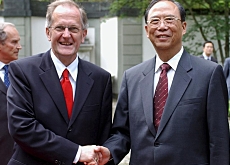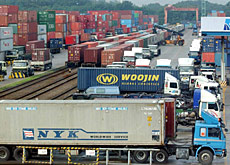Deiss wins pledges for more trade with China

Swiss Economics Minister Joseph Deiss is cautiously optimistic about plans to boost economic ties with China.
In an interview with swissinfo, he said the authorities in Beijing would consider a study into a possible free-trade accord.
Deiss met the vice-prime minister, Zeng Peiyan, and the minister of commerce, Bo Xilai, during his official visit to China which began on Thursday.
On the agenda were talks about a memorandum of understanding on a report about a possible free-trade accord between China and the four member countries of the European Free Trade Association (Efta), including Switzerland.
On Saturday Deiss, who was leading a business delegation, visited the eastern city of Suzhou, where several Swiss firms have opened outlets.
Swiss companies have complained about violations of intellectual property rights and other obstacles hindering trade.
China is Switzerland’s second most important economic partner in Asia with a trade volume of SFr5 billion ($3.9 billion) and a huge market potential.
This week Deiss is scheduled to travel to Washington for talks on bilateral relations and trade ties with the United States.
swissinfo: What were the main achievements of your visit to China?
Joseph Deiss: On a general note, I think the Chinese government is keen to strengthen economic relations with our country. The authorities are also willing to address all issues raised by our delegation and look for solutions.
Relations with China are excellent and there is clearly the intention to make further steps.
swissinfo: What makes the Chinese market so attractive for Swiss businesses?
J.D.: China has a very large economy and it is growing rapidly. The volume of trade with Switzerland has reached SFr5 billion. Last year alone we recorded an increase of at least 30 per cent.
The Chinese market has a great potential for Swiss businesses, particularly [those in] the machinery industry, but also pharmaceutical and chemical companies as well as the banking sector and the tourist industry.
swissinfo: During your visit you discussed the possibility of a free-trade accord between China and the so-called Efta countries, including Switzerland. What timeframe is realistic for such a deal?
J.D.: We are at the very beginning of discussions, but it is too early to talk about negotiations. I presented a proposal on behalf of the other three Efta countries on whether China was prepared to consider a feasibility study into a free-trade accord.
The reaction was positive and the minister of commerce, Bo Xilai, assured us that the Chinese government is prepared to make a study. The coming weeks will show what timeframe is realistic for possible negotiations.
We are among many others who would like to liberalise trade with China because of its huge economic potential.
Beijing appears genuinely interested in a deal and I think Switzerland can benefit from its good reputation among government ministers and officials… because our country was among the first to open diplomatic relations with modern China 55 years ago.
swissinfo: You are heading now to Washington for exploratory talks on a free-trade deal with the US. What trump cards does Switzerland have?
J.D.: My aim is to meet top-level representatives of the US administration and of Congress to take stock and discuss different aspects of our economic ties.
It’s been a very long time – six years – since the last visit by a Swiss economics minister to the US, the second most important economic partner of Switzerland.
A free-trade accord is just one option and what we suggest is to have initial discussions about possible negotiations.
I think Switzerland is an important trading partner for the US but also an important investor. Swiss investments amount to about SFr80 billion.
swissinfo: Your visits to Asia and the US could be seen as the first steps towards implementing a shift in Switzerland’s foreign and economic policies. Is Switzerland no longer interested in Europe as a partner?
J.D.: It certainly is. The visits are simply the logical consequence of the government’s first strategy paper on Switzerland’s foreign-trade policy. Our priorities remain the liberalisation of global trade within the World Trade Organization, and the European Union is clearly our main partner.
We need favourable conditions with the EU for trade and other economic relations. Therefore it is vital for Switzerland that its voters approve the extension of a labour accord with the ten new EU member states in September.
Switzerland, a country with a long tradition of a universal approach to trade, also builds on bilateral relations. It is crucial to have regular contacts on the highest level with our most important partners, such as the US.
swissinfo-interview: Urs Geiser
China is Switzerland’s second most important trading partner in Asia behind Japan.
There are about 270 Swiss companies in China employing almost 55,000 people.
Swiss investment in China totals about SFr5 billion, putting Switzerland in the top 15 countries investing in the country.
The EU is Switzerland’s top trading partner, ahead of the United States.

In compliance with the JTI standards
More: SWI swissinfo.ch certified by the Journalism Trust Initiative












You can find an overview of ongoing debates with our journalists here . Please join us!
If you want to start a conversation about a topic raised in this article or want to report factual errors, email us at english@swissinfo.ch.